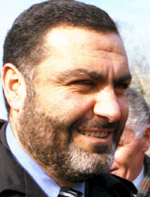Beginning in the previous four editions
When Isaac Newton was writing his third law (F=-F), little did he know that many years later, the long-suffering Armenia would eventually become independent and that its political system would be formed with that letter of the law. Of course, the law constituted by the English scientist was so universal that it could have been applied anywhere and anytime; but it is one thing to apply it and another to lay it as the base of something else.
The year 1995 was a turning point for the Republic of Armenia conditioned by the ceasefire declared in May of the previous year and some of the consequences that followed. First, the government had started to get more intensively and effectively involved with the rules and regulations and economy of the country and that was making the opposition impatient. Secondly, with the end of the war, the opposition had acquired more freedom to draw plans for the change of power. There was no longer a moral ban on changing power during the war or fearing the repetition of the bad experience of the neighboring countries. Third, in a year society had grown accustomed to the end of the war and the thought of not conquering “new horizons”. So, the society was trying to find its spot.
Years ago while conducting research on a film I had the chance to watch the full-length taping of the founding convention of the Land Defenders’ Union. Vazgen Sargsyan’s speech, the questions asked by those present and the concerns meant that the returned soldiers who had fought for the Homeland were founding an organization aimed at regulating and placing their issues in front of the state and the government. Nobody noticed the intention of the organization’s participation in the political life of the country or the impact that it would have. You can not predict from the sentimental environment at the convention that the Land Defenders would become part of the authorities.
If we are forced to elect legislators from the once field commanders, we “owe our thanks” not to the Armenian National Movement or Vazgen Sargsyan, but rather Isaac Newton’s third law by which the positive force (influence) is equal to the negative force (counterinfluence).
The opposition of the time did not have any plan for the victorious soldiers besides to be amazed to see that those people were not with them in the justice struggle. If it tried to plan anything, it would get the same organization-the Land Defenders Union- because that was the only reasonable thing to at the time.
Let’s suppose that Vazgen Sargsyan was in a rush and delayed the issue of gathering his confederates. What would happen in that case? The same Land Defenders Union would have to form the opposition (particularly Vazgen Manukyan with his reputation as Defense Minister) and what would it do? That organization would be led to the higher authorities. Today we would once again be forced to elect legislators among field commanders and have feudal power in different parts of Armenia, if not the entire territory.
The opposition could not have used the potential of the victorious soldiers and wish them off because the next meeting would be during the next change of power and…it would be rather unpleasant.
If we take a look at the parliamentarians elected in 1995, it immediately becomes clear that the people from the army included in the political field were people who could have represented the interests of the society as well, including Albert Bazeyan, Smbat Ayvazyan, Myasnik Malkhasyan, etc. In contrast to the actual situation, that representation was not a business plan, but rather the idea of assimilating the parallel society to the general society.
But Armenia did not know how to proceed to solve that problem. The political system was going through changes with the influence-counterinfluence logic and the plan of the victorious soldiers was moving downwards.
In normal societies, the civil system is built on the equalization of powers which is not the relationship between the votes of the two presidential candidates that have made it to the final round, rather the organizations unbalancing the state mechanism as a whole, including political forces, NGOs, mass media, liberal individuals.
In Armenia, it turned out that the supposable positive and dubious negative poles stood in front of each other and the “minus” sign was for the victorious soldiers who had returned from the war and who still continue the victory march.

